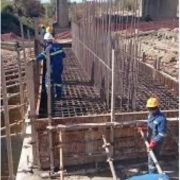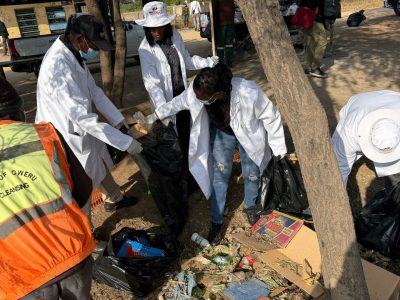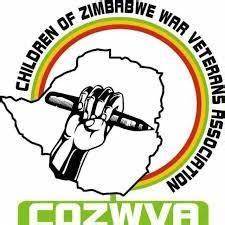My fellow South Africans,
Exactly half a year has passed since we declared a national state of disaster in response to the coronavirus pandemic.
In that time, more than 15,000 South Africans have lost their lives to the disease and more than 650,000 have been confirmed as infected.
Our economy and our society have suffered great devastation.
We have endured a fierce and destructive storm.
But, by standing together, by remaining resolute, we have withstood it.
Two months ago, at the height of the storm, we were recording around 12,000 new cases a day.
Now, we are on average recording less than 2,000 cases a day.
We now have a recovery rate of 89%.
Even as restrictions have eased over the last month with our move to alert level 2, there has been a gradual, but steady, decline in new infections, hospitalisations and deaths.
Demand for hospital beds, ventilators, oxygen and other essential medical requirements has also reduced steadily.
We have succeeded in overcoming the worst phase of this epidemic while protecting the capacity of our health system.
I wish to applaud you, the people of South Africa, for this achievement and for the thousands of lives that have been saved through your collective actions.
This achievement has also been recognised by the World Health Organisation, which has been working closely with us to strengthen our response.
As we said earlier they have continued to give us advice and have even deployed their experts to our country.
We are grateful for all the support we received from the Director General of the World Health Organization in Geneva, as well as the Africa Centres for Disease Control and Prevention.
Although we have made remarkable progress, a number of our people are still getting infected and some are losing their lives.
By any measure, we are still in the midst of a deadly epidemic.
Our greatest challenge now – and our most important task – is to ensure that we do not experience a new surge in infections.
Several countries around the world have been hit by a ‘second wave’ or a resurgence of infections.
A number of these countries had passed the peak of the disease and had seemingly brought the virus under control.
Some of them had even lifted most of the restrictions on economic and social activity.
In many cases, the second wave has been more severe than the first.
Several countries have had to re-impose a hard lockdown.
Our public health response is now focused on further reducing the transmission of the virus and preparing for a possible resurgence.
We have now taken a decision to keep increasing coronavirus testing.
Due to the decline in new infections and the reduced pressure on our health facilities, we now have sufficient testing capacity to expand the criteria for testing.
Among the categories of people we will now be able to test are all those who are admitted to hospital, outpatients with COVID symptoms, and individuals who have been in close contact with confirmed cases whether or not they themselves have symptoms.
Alongside increased testing, we are improving contact tracing through the deployment of the COVID Alert South Africa mobile phone app and the COVID Connect WhatsApp platform.
Effective testing and contact tracing systems will allow us to quickly identify and contain outbreaks before they spread further.
I want to make a call this evening to everyone who has a smartphone in South Africa to download the COVID Alert mobile app from the Apple App Store or Google Play Store.
The app has been zero-rated by mobile networks, so you can download it without any data costs.
Using Bluetooth technology, the app will alert any user if they have been in close contact with any other user who has tested positive for coronavirus in the past 14 days.
The app is completely anonymous, it does not gather any personal information, nor does it track anybody’s location.
The Department of Health has also developed WhatsApp and SMS systems for people without smartphones to provide them with test results and alert them to any possible exposure to the virus.
Contact tracing is an important preventative measure to protect yourself and your close family and friends.
We will be undertaking a nationwide survey to assess the actual levels of infection within society.
This survey – known as a seroprevalence survey – uses antibody tests to see if a person has been exposed to the coronavirus.
A nationwide study would allow scientists to estimate the extent of asymptomatic infections and immunity within the population as well as better understand the transmission patterns of the virus.
We continue to maintain our health care capacity to ensure that we are able to manage any possible outbreaks of infections effectively, and to ensure that everyone receives the care they need.
The Department of Health is working closely with trade unions and other stakeholders to ensure that all health care and other frontline workers have the necessary personal protective equipment and safe working conditions.
I wish to thank the nation’s frontline workers for raising the issue of safety so sharply and so consistently.
I wish to thank them for their dedication to caring for our people and for the enormous sacrifices they have made.
While we are working to prevent further transmission of the virus, we are also preparing for the time when a vaccine becomes available.
To ensure that South Africa is able to access an effective vaccine as quickly as possible and in sufficient quantities to protect the population, the country is participating in a global initiative supported by the World Health Organisation to pool resources for the development and distribution of a vaccine.
Through this initiative, South Africa joins other countries in supporting several vaccine development programmes and seeking equitable access to successful vaccines at a lower cost.
Through our position as chair of the African Union, we have been advocating for equitable access across the globe so that no country should be left behind.
We are also investing in our own capacity to produce and distribute a vaccine locally, so that South Africa can play a key role in the effort to expand access to vaccines.
Our country is already participating in three vaccine trials, demonstrating the capability of our scientific community.
Fellow South Africans,
A month ago, the significant decrease in new infections enabled the country to move to coronavirus alert level 2.
Now, with the further progress we have made as infections have come down further, we are now ready for a new phase in our response to the pandemic.
We have withstood the coronavirus storm.
Now is the time to return our country, its people and our economy to a situation that is more normal, that more resembles the lives that we were living six months ago.
It is time to move to what will become our new normal for as long as the coronavirus is with us.
While much economic activity resumed from June, it is now time to remove as many of the remaining restrictions on economic and social activity as it is reasonably safe to do.
Following consultations with provincial and local government representatives, and drawing on the advice of scientists and engagements with various stakeholders, Cabinet decided this morning that the country should move to alert level 1.
The move to alert level 1 will take effect from midnight on Sunday 20 September 2020.
This move recognises that levels of infection are relatively low and that there is sufficient capacity in our health system to manage the current need.
The move to alert level 1 will mean a further easing of restrictions on gatherings.
– Social, religious, political and other gatherings will be permitted, as long as the number of people does not exceed 50% of the normal capacity of a venue, up to a maximum of 250 people for indoor gatherings and 500 people for outdoor gatherings.
– Health protocols, such as washing or sanitising of hands, social distancing and mask-wearing, will need to be strictly observed.
– The maximum number of people who may attend a funeral is increased from 50 to 100 due to the higher risk of viral transmission at funerals. Night vigils are still not permitted.
– Venues for exercise, recreation and entertainment – such as gyms and theatres – which were limited to no more than 50 people, will now be allowed to accommodate up to 50% of their venue’s capacity as determined by available floor space, subject to social distancing and other health protocols.
– Existing restrictions on sporting events remain in place.
Where required for the purposes of voter registration or special voting, the Independent Electoral Commission will be allowed to visit correctional centres, health facilities, old age homes and other similar institutions.
This will be subject to all the health protocols, include the wearing of masks and washing or sanitising of hands.
One of the earliest measures we took to contain the spread of the virus was to severely restrict international arrivals and to close our borders.
With the move to alert level 1, we will gradually and cautiously ease restrictions on international travel.
We will be allowing travel into and out of South Africa for business, leisure and other travel with effect from 1 October 2020.
This is subject to various containment and mitigation measures:
– Travel may be restricted to and from certain countries that have high infection rates. A list of countries will be published based on the latest scientific data.
– Travellers will only be able to use one of the land border posts that have remained operational during the lockdown or one of the three main airports: King Shaka, OR Tambo and Cape Town International Airport.
– On arrival, travellers will need to present a negative COVID-19 test result not older than 72 hours from time of departure.
– Where a traveller has not done a COVID-19 test prior to departure, they will be required to remain in mandatory quarantine at their own cost.
– All travellers will be screened on arrival and those presenting with symptoms will be required to remain in quarantine until a repeat COVID-19 test is conducted.
– All travellers will be asked to install the COVID Alert South Africa mobile app.
Countries that have used this type of app have been able to manage the coronavirus pandemic quite effectively.
In preparation for the re-opening of our borders, South African missions abroad will open for visa applications and all long-term visas will be reinstated.
The tourism sector is one of our greatest economic drivers.
We are ready to open our doors again to the world, and invite travellers to enjoy our mountains, our beaches, our vibrant cities and our wildlife game parks in safety and confidence.
Also as part of the gradual return to regular economic and social activity:
– The hours of curfew have been changed. The curfew will now apply between midnight and 4am.
– The sale of alcohol at retail outlets for home consumption is now permitted from Monday to Friday, from 09h00 to 17h00.
– Alcohol will be permitted for on-site consumption in licensed establishments only and with strict adherence to the curfew.
In the next few days, the updated regulations will be published and Ministers will provide detailed briefings.
The Department of Public Service and Administration will shortly issue circulars to all public servants on the measures that will enable the return of all areas of government to full operation safely and without undue delay.
Because there are several remaining restrictions that can only be enacted through disaster regulations, we have already extended the national state of disaster by a month to 15 October 2020.
The move to alert level 1 removes many of the remaining restrictions on economic activity, although it may be some time before it is safe for all sectors to return to full operation.
Global and domestic demand and supply of goods and services for some sectors will remain low for the foreseeable future, regardless of the lifting of restrictions.
It is therefore vital that we move with urgency to rebuild our economy, restore growth and create jobs.
Following several weeks of engagement, the social partners at NEDLAC have made tremendous progress on an ambitious social compact for economic recovery.
This represents a historic milestone for our country, demonstrating what can be achieved when we unite to confront an urgent crisis.
Cabinet will build on this emerging common ground to finalise the country’s economic reconstruction and recovery plan in the coming weeks.
The reconstruction and recovery plan that will be finalised will build on the R500 billion economic and social relief package we announced in April, which has provided vital support for households, companies and workers at a time of dire need.
Through the special COVID-19 grants and the top-up of existing grants, well over R30 billion in additional support has already been provided directly to more than 16 million people from poor households.
More than 800,000 companies have benefited through the UIF wage support scheme and through the grants and loans provided by various government departments and public entities.
More than 4 million workers have received R42 billion in wage support, helping to protect these jobs even while companies were not able to operate.
This support has touched the lives of millions of South Africans, and has made a real difference to those in greatest need.
The UIF benefit has been extended until the end of the national state of disaster to ensure that those workers and companies whose income remains at risk can continue to be supported.
In addition to those businesses that have received direct support, many more companies have benefited from tax relief measures worth in the region of R70 billion.
And millions of South Africans have benefited from the historic reduction in interest rates.
Adjustments have been made to the Loan Guarantee Scheme to make it easier for companies of any size to access credit at low interest rates, with repayments delayed for as much as twelve months.
We encourage all companies who have faced a disruption of their earnings to seek support from this scheme while the economy recovers.
At the beginning of the pandemic we appealed to South Africans to demonstrate their solidarity and patriotism by supporting government’s effort in dealing with the pandemic.
We established the Solidarity Fund, which has received some 300,000 donations from almost 15,000 individuals and nearly 2,500 companies.
The donations came from ordinary people and workers, religious organisations, political parties, non-governmental organisations, trusts and foundations.
Through its work, the Solidarity Fund has demonstrated the power of social partnership and cooperation.
Since it was established, it has raised over R3.1 billion in donations from companies, foundations and individuals.
It has, to date, allocated R2.4 billion to support key areas of our national coronavirus response.
These include the purchase of testing equipment, medical supplies and personal protective equipment and the local manufacture of ventilators. It extends to food relief for vulnerable households, vouchers for subsistence farmers, care for survivors of gender-based violence and a national COVID awareness campaign.
Fellow South Africans,
Violence against women and children has continued unabated during the period of the pandemic.
We are determined to continue with our resolve to deal with the scourge of gender-based violence and femicide.
Based on the latest data, we have identified 30 hotspots around the country where this problem is most rife.
As we move to the next alert level, we are increasing and improving support services for survivors of gender-based violence, particularly in the identified hotspots.
We have to do so not just because the lockdown is being eased, but as part of work already underway to implement the National Strategic Plan adopted by Cabinet earlier this year.
This includes the rollout of an integrated and multidisciplinary model that incorporates psycho-social support, case investigation, housing services and economic empowerment for survivors under one roof.
The Khuseleka One Stop Centres expand on the mandate of the existing network of Thuthuzela Care Centres, and are already operational in districts in the North West, Limpopo and the Eastern Cape.
Work is underway to expand this model of care and support to all provinces.
Let us spare no effort to eradicate the problem of violence against women and children.
The coronavirus pandemic has exposed the extent to which corruption has infected our society and robbed our country of vital resources at the time we need them most.
Our law enforcement agencies are making important progress in investigating all allegations of the misuse of COVID-related funds.
The Special Investigating Unit has submitted its first interim report to me, detailing the progress of its investigations in all provinces and in some national departments and entities.
As the SIU concludes its investigations, we will be in a position to make public their findings.
The SIU is working alongside 8 other agencies in the COVID-19 fusion centre to detect, investigate and prosecute any instances of corruption.
As part of the effort to encourage transparency and accountability, the National Treasury has published online the details of all COVID-related contracts awarded by public entities at national and provincial level.
This is a historic development that we hope will set a precedent for all future expenditure of this nature.
The Office of the Auditor-General has also played an extremely valuable role in identifying weaknesses and risks in the management of COVID resources, and detecting cases of possible fraud for investigation by the agencies represented in the fusion centre.
We continue to work to strengthen our anti-corruption efforts through measures to provide the NPA and other law enforcement agencies with the human and financial resources needed to tackle corruption, strengthening of specialised commercial crime courts, which will help expedite COVID-related cases, and the finalisation of the new National Anti-Corruption Strategy.
We are determined to ensure that the worst of this pandemic is behind us.
We cannot afford a resurgence of infections in our country.
A second wave would be devastating to our country, and would again disrupt our lives and livelihoods.
It is up to each and every South African to ensure that this does not happen.
As we settle into a new normal and learn to live alongside the virus, we must continue to exercise every possible precaution to avoid infecting others.
This is how we are going to keep ourselves safe and keep our economy open:
Firstly, we must wear a mask whenever we are in public and make sure that it covers both the nose and mouth.
Secondly, we must maintain a distance of one-and-a-half metres from other people at all times and ensure that we are in spaces that are well ventilated.
Thirdly, we must continue to wash our hands or use hand sanitiser regularly.
Fourthly, we must download the COVID Alert South Africa app, and protect our families and communities.
In just over a week from now, South Africans will celebrate Heritage Day under conditions that will be better in many ways from what we have experienced over the last six months.
I urge everyone to use this public holiday as family time, to reflect on the difficult journey we have all travelled, to remember those who have lost their lives, and to quietly rejoice in the remarkable and diverse heritage of our nation.
And there can be no better celebration of our South African-ness than joining the global phenomenon that is the Jerusalema dance challenge.
So I urge all of you to take up this challenge on Heritage Day and show the world what we are capable of.
Just as we have acted together to defeat this virus, we must roll up our sleeves and get to work rebuilding our economy.
We have a mammoth task ahead of us.
It will take the combined effort of each and every South African to restore our nation to prosperity and development.
This is now the task of our generation and our work starts today.
We have overcome doubt and cynicism to confront the worst public health threat in living memory.
We have shown what South Africans are capable of when we join forces.
Let us hold on to that spirit of unity and solidarity.
Let us move forward with determination and resolve.
May God continue to bless South Africa and her people.
I thank you.









Comments